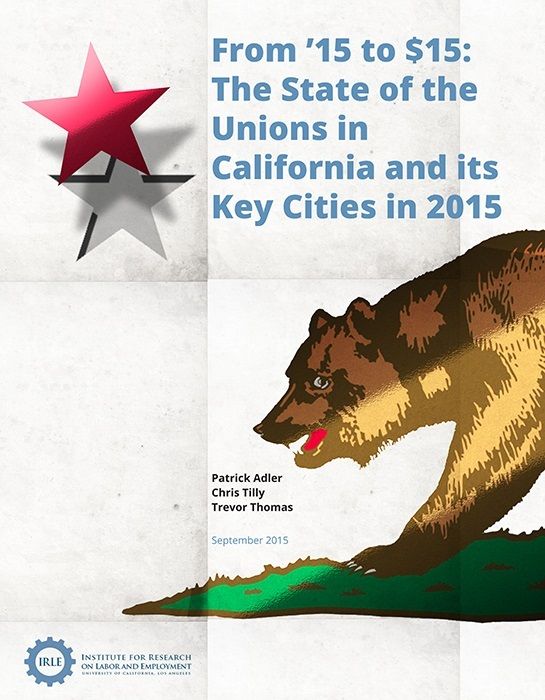
Even if union workers are exempted from Los Angeles’ forthcoming minimum wage increase, it is unlikely to directly impact their salaries in the short term, according to a new UCLA report, because the majority of union workers in the city already earn pay at or above current minimum wage.
But the increase in the city’s minimum wage over the next five years most likely will boost union wages over time, says the annual State of the Unions report by the UCLA Institute for Research on Labor and Employment. That’s because unions typically negotiate increases pegged to the wage floor as a way to maintain a pay advantage over non-union jobs.
In June, the Los Angeles City Council approved an ordinance that will raise the minimum wage from $9 to $15 an hour by 2020, starting with an increase to $10 an hour in January 2016. The council is now weighing whether to exempt unionized workers, after some unions argued that it would allow them to negotiate more favorable contracts. Beyond the city of Los Angeles, several other jurisdictions this year have boosted their mandatory minimum pay, including the city of San Francisco, Los Angeles County and the University of California system. Similar proposals are under consideration in Santa Monica, Culver City and other municipalities in Southern California and in the Bay Area and across the country.
The report notes that the overall effect on membership in public and private sector unions is difficult to predict, but the authors say that minimum wage increases approved in Los Angeles and elsewhere are most likely to increase union rolls.
In lower-paying industries, according to the report, the higher minimum wage is likely to narrow the pay advantage offered by unions. On one hand, this could make union membership less attractive to workers who previously might have been able to find comparable pay in non-union jobs. On the other hand, once employers recognize the narrower gap between union and non-union salaries, they may be less opposed to workers joining unions.
“While the minimum-wage movement is rightly considered a political win for labor unions who have seen membership shrink in recent years, the actual impact on union rolls will depend on countervailing forces,” said Chris Tilly, the institute’s director and a UCLA professor of urban planning. “There are reasons to expect a positive overall effect on union membership, but the results remain to be seen.”
Union jobs tend to pay well above statutory minimums. In 2015, only 0.6 percent of union workers in Los Angeles earn the current minimum wage of $9 an hour or less (plus tips), according to the report, compared with 6.5 percent of non-union workers. And 20 percent of union workers earn less than $15 an hour, compared with 46 percent of non-union workers.
“Given the sustained drop in unionization across most sectors over the past 50 years, these recent legislative efforts show that worker protections have not been completely routed,” the report says. “Indeed, labor organizing hasn’t had a victory like this in a long time.”




